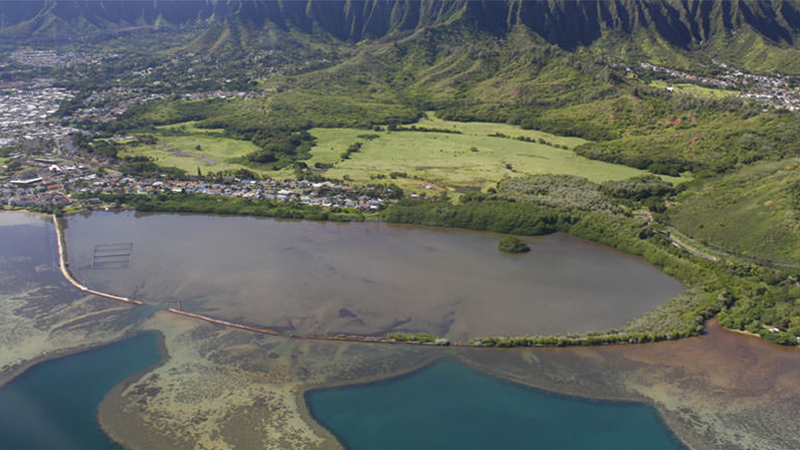Effects of loko i‘a (fishpond) restoration on climate-dependent ecosystem dynamics in Kāneʻohe Bay, O‘ahu, Hawai‘i
PRINCIPAL INVESTIGATOR: Lisa McManus
Co-INVESTIGATORS: Elizabeth Madin, Yoshimi Rii, Kawika Winter, Anne Innes-Gold
Research Track: Aquaculture

Loko i‘a (traditional Hawaiian fishponds) once played a large role in an integrated agroecology system. Historically, loko i‘a were used to trap and raise fish; they were designed to encourage growth of limu and algae which would support herbivorous fish populations. Loko i‘a in pre-contact Hawai‘i may have yielded around 2 million pounds of fish per year, while present-day local aquaculture efforts supply only about 20,000 pounds of seafood per year. A recent push for loko i‘a restoration could significantly increase the amount of local seafood available, both by creating a surplus of fish inside the ponds and potential ‘spillover’ effects to supplement estuary fish stocks. However, there are also challenges, including, in particular, climate change, which may impede restoration efforts by decreasing the productivity of culturally and ecologically important ecosystems and resources. This research aims to evaluate the impacts of loko i‘a restoration on ecosystem dynamics in Kāneʻohe Bay, O‘ahu, Hawaiʻi under a changing climate.
The research team will test how well loko i‘a restoration can supplement fish populations and fisheries harvests within fishponds and in surrounding estuary and bay waters (ʻamaʻama or striped mullet, in particular). Through modelling, they will explore the possible impact of climate change by projecting ecosystem dynamics under multiple emission scenarios. Results will be shared with local non-profits Paepae o He‘eia and Hui Mālama Loko I‘a and at a national level with managers and other researchers to facilitate reciprocal knowledge sharing.

